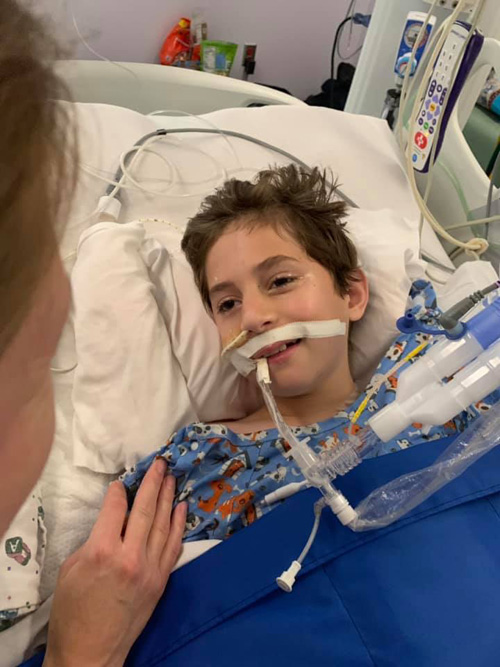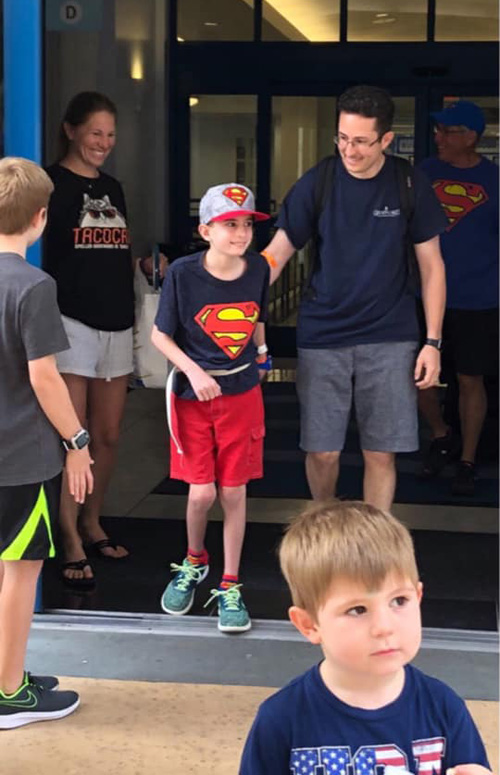Background
For those of you who don’t know us, 2019 was the worst year of our lives. On May 4, a series of severe, uncontrollable seizures forced us to induce our son, Isaiah, into a coma. For two months, every attempt to bring him back was met with a return of persistent, relentless seizure activity. We spent every second on edge as we watched our son fight for his life. In the search for answers, we worked with doctors from Pediatric ICU, Neurology, Rheumatology, Nephrology, Infectious Disease, Immunology, Endocrinology, Pulmonology, Palliative Care, and Hematology. In addition to countless blood draws, IVs, tests, EKGs, x-rays, and constant EEG monitoring, Isaiah endured three spinal taps, two CT scans, four brain MRIs, two full-body MRIs, three days of hypothermia, two high-dose steroid treatments, three feeding tubes, a blood transfusion, four failed attempts at burst suppression, five rounds of plasmapheresis, 37 days on a ventilator, 41 days in ICU, and 89 days total in the hospital. We watched his vitals crash time and time again and came very, very close to losing him more times that I can count. It was by far the deepest, most prolonged, and most consuming suffering we’ve ever experienced.
Although we’re still very much in the battle (more on that toward the end of this post), we’re far enough removed from the trenches of ICU that we’re finally able to maintain our composure enough to share a bit more of our story. You see, we learned quite a lot over our three-month stay in the hospital…about grief and suffering and frustration and helplessness and survival and faith. The post that follows contains much of what we learned…our pathway through the darkness.
The Bible and Suffering
My wife and I are devout Christians. We have been for a very long time. So, I knew what the Bible had to say about suffering. And frankly, in the midst of my suffering, I wasn’t a fan. It wasn’t comforting.
Despite what many preach, nowhere does the Bible say that doing the right things or praying the right prayers or practicing religion in the right way will allow you to avoid suffering. In fact, the Bible says quite the opposite. It says things like, “You will have suffering in this world.” (John 16:33) Not encouraging, John.
Additionally, if you take a close look at the lives of the people who followed Jesus most ardently, you’ll find that most of them met pretty terrible ends. John the Baptist is a good example. “Among those born of women there has arisen no one greater than John the Baptist.” That’s what Jesus said about John the Baptist. You don’t get a better reference for how you’ve lived life than that. And do you remember how this icon of humanity died? Not in luxury and prosperity. No, he died headless in prison. Worth noting: Jesus was alive when this happened. Jesus could have saved John; but he didn’t. So, that’s less than encouraging, Jesus.
That said, the Bible basically promises that life will have suffering…unavoidable suffering…and not just the “I had a hard day at the office” kind of suffering.
Faith and Doubt
It was around 2am on a night when Isaiah’s condition was critical but stable—thanks in part to a powerful blend of sedation medications. His ventilator was doing most of the work for his lungs, but every so often, he was taking shallow breaths on his own power. The nurses had just rotated him from his side to his back (rotation was done every two hours to prevent bed sores). He had tolerated his most recent feeding tube feeding well. It was a fleeting blessing of uninterrupted stability, and I had taken it to post an update on our CaringBridge blog. Careese was on the couch, praying or doing something else godly. I was sitting in a chair next to Isaiah’s bed. Unable to sleep, out of energy for medical research, and out of words for prayers, I tapped Psalm 1 on my Bible app and softly played the audio version.
I half listened and half replayed the day in my mind while stress-chewing the inside of my cheeks.
The Psalms are so wonderful. Here you have a guy—a guy described as a man after God’s own heart—wrestling with suffering like a normal human being. In fact, he sounded an awful lot like Careese and I did. One chapter, David is saying stuff like,
1“O Lord, in your strength the king rejoices,
and in your salvation how greatly he exults!
2 You have given him his heart’s desire
and have not withheld the request of his lips. Selah
3 For you meet him with rich blessings;
you set a crown of fine gold upon his head.
4 He asked life of you; you gave it to him,
length of days forever and ever.
5 His glory is great through your salvation;
splendor and majesty you bestow on him.
6 For you make him most blessed forever;[a]
you make him glad with the joy of your presence.
7 For the king trusts in the Lord,
and through the steadfast love of the Most High he shall not be moved.” Psalm 21:1-7
Then, literally, the next chapter he’s yelling into the air:
1“My God, my God, why have you forsaken me?
Why are you so far from saving me, from the words of my groaning?
2 O my God, I cry by day, but you do not answer,
and by night, but I find no rest.” Psalm 22:1-2
It’s like the guy was bipolar. Man, that was comforting. I figured if David was allowed to praise God one minute and rant and rave at him the next, it was probably ok for me to do it, too.
What the heck, James?
On another sleepless night in the ICU, I turned to the book of James. We got off to a rocky start, me and James.
“Count it all joy, my brothers, when you meet trials of various kinds” James 1:2
I glanced over at my son in his ICU bed. At that moment, he no longer looked like himself. His face was swollen due to large volumes of IV fluids. Wires, tubes, and cords covered him from head to toe. (See the photo attached. He looked like that; but it was night at the time I was reading James 1, so his room was darkened.) The only sounds in the room were the sounds of the machines pumping out meds at a steady pace and the sounds of the ventilator doing the work Isaiah’s body was unable to do on its own. It had been a brutal day. We still had no answers. We were running out of options and running out of time.
I had one thought: “Nope. Impossible. That’s stupid, James.”
I closed my Bible. Done with James. Done with the Bible. Done for awhile.
Over the course of the next few days, that verse punished me and my faith in an inerrant, living word of a living God.
Then, God whispered.
What if I looked at James chapter one less as an admonition and more as a recipe? What if James wasn’t saying a patronizing, “Hey, I know your son is dying; but turn that frown upside down, buddy! Don’t worry. Be happy!”? What if James was instead saying, “Consider that there could be a path to joy in the midst of the greatest suffering imaginable. Consider that. Read on and let me show you the way.”
What followed was indeed a path to joy—a different and more difficult joy than I had ever understood before—in the middle of the darkest time of our lives. The rest of this very wordy (sorry) blog post contains the recipe. It worked for us. It worked in the face of utter despair. If you’re suffering, I believe it can work for you, too. Because I still believe in an inerrant, living word of a living God.
Step 1: Talk. Rant and rave if you must; just start the conversation.
“If any of you lacks wisdom, let him ask God, who gives generously to all without reproach, and it will be given him.” James 1:5
I think the knee-jerk human response to suffering is the single-word question: why? Why me? What did I do to cause this? What can I do to make it stop? Perhaps it isn’t the universal human reaction; but it was my reaction.
I do think all humans carry with them a deep desire to know the “why” of suffering and to search for answers. To me, the essence of James 1:5 is this: God isn’t hovering over our suffering with an attitude of “Deal with it.” He’s there in the midst of our suffering saying, “Ask me. Ask me for understanding. Ask me for wisdom. Yell at me about it like David. Cry about it like Moses. Doesn’t matter. Just ask. Just talk to me.”
Step 2: Acknowledge and accept the gifts around you.
“Do not be deceived, my beloved brothers. Every good gift and every perfect gift is from above, coming down from the Father of lights, with whom there is no variation or shadow due to change.” James 1:16-17
There were many times throughout our stay in the hospital when we received gifts. From gifts of a text from a friend at just the right moment to gifts of Isaiah smiling at us when we thought all was lost to gifts of a parking space opening up at just the right time to gifts of gift cards and housing and hugs. My estimation is that God gives all of us gifts like this more regularly than any of us admit, because we humans are really good at rationalizing the miraculous out of everything. In fact, I decided to test my theory. Since we left the hospital, I’ve spoken to a couple groups about our experience. I asked both groups the following question:
How many of you have ever lost some item, whether it be mundane or important—a TV remote, a phone, an important document, car keys, etc.—and thrown a quick prayer up to God about said item? Something like, “Dear God, please help me find my [insert name of item here]! I’m running late and really need my [insert name of item here]. Amen.” And then, after uttering said prayer, how many of you magically found your item almost immediately afterward?
Do you know how many hands went up in both groups I spoke to? Almost every single one. My bet is that your hand would go up if I asked you the same question. Yet, for some reason, we rationalize God out of these small gifts. Here’s what James is saying: every good and perfect gift is from above—the gifts that defy logic and the gifts that don’t. Pay attention to the little miracles and the big. Thank God for them. And remember that a God who cares about helping you find your car keys most certainly cares about walking with you through excruciating challenges.
Step 3: Be quick to listen, slow to speak, and slow to become angry.
“Know this, my beloved brothers: let every person be quick to hear, slow to speak, slow to anger;” James 1:19
Ok. This verse tells me that James does, in fact, understand suffering. When I’m in a trial, I’m the exact opposite of this verse. I’m quick to vent about my agony. I have zero desire to listen to anyone else. James is saying, “Do you want peace in the midst of trial? Stop talking, and start listening. Pay attention to the people around you. Listen to their stories.”
That realization was a turning point for both Careese and me. As soon as we started listening to the stories of the people around us in the ICU, our world changed. The stories were brutal.
There was a three-year-old who found his father’s gun and accidentally shot himself in the head. There was an eighth grader who was stabbed in the head with scissors by a fellow classmate. There was a mom forced to make a decision no mom should ever have to make: whether or not to take her brain-dead son off of life support. There was a granddad who had lost the grip of his grandson’s hand while crossing the street. He watched helplessly as his grandson was hit by a truck. Tragedy. After. Tragedy.
Even worse, almost none of our ICU-mates had support systems like we did. Careese and I had each other. We had our parents. We had friends. We had family. We had church support from literally all over the world. We had thousands of people praying and acting. The more we took time to listen to the stories of the people around us, the more we began to realize just how fortunate we were. Yes, we were suffering; but we weren’t alone. Many of our new friends were alone. There were even a few kids in the CPS system who suffered in ICU alone—laying in their beds for days without so much as a parent or grandparent stopping by to visit.
Of course, aside from the thankfulness we felt for our support network, none of this made us feel better. It certainly didn’t bring us any semblance of joy. In fact, in many ways it added to our suffering. But, it opened the door to joy that would eventually come.
Step 4: Now that you’ve listened to those around you, start acting. Start doing stuff.
“But be doers of the word, and not hearers only, deceiving yourselves.” James 1:22
As we spent more and more time listening to the stories of the families around us, it became clear that action trumped advice every time. Exactly no one wanted advice on how to handle grief. They needed a hug. They needed a gift card. They needed someone to listen. They needed coffee. They needed someone to care. Mostly, they didn’t need us to speak at all. So, we acted. Well, Careese acted. I sometimes acted, sometimes avoided humanity altogether. Careese hugged and listened and passed out coffee and gift cards and love to every family she ran into. I did my best to keep up. Then, the weirdest thing happened. We felt moments of peace. It wasn’t an easy peace to be sure, but it was a “survive another two hours” type of peace. And, at times, we started to feel glimmers of joy as we watched God work in the lives of our new friends.
Step 5: What if I’m the one who needs help more than anyone else around me? Keep looking. Keep listening.
“Religion that is pure and undefiled before God the Father is this: to visit orphans and widows in their affliction, and to keep oneself unstained from the world.” James 1:27
There was a day when we became the longest tenured tenants of the ICU. We still had no answers and Isaiah was running out of time. Every hour we faced some new complication. We had no indication that Isaiah would ever depart a vegetative state—even if he woke up from his coma. Things were looking bleak. I stopped listening to those around me. ICU newbies would say things like, “We’ve been here almost 24 hours! The doctor says that our daughter may have to remain here overnight as a precaution. I don’t know how we can survive another night of this!” I’d secretly think, “Please. Try being here a month. Try not having an answer or an end in sight. Try not knowing whether or not you’ll ever feel your child hug you again.”
In James 1:27, it was almost as if James was telling me: “Do you want a pathway to a bit of peace and joy in the midst of this pain? I know it’s hard, but look around you. Keep listening. There is someone out there who is worse off than you are. And they need you. If you can’t find someone, let me tell you more directly: the orphans. The widows. The societal outcasts. Look after those people and you’ll find religion. You’ll find peace and joy in the midst of the trial…both their joy and your own.”
Turns out, James was right. The better we did at listening to the people around us, the more peaceful we became. We cried happy tears as we watched some of our new friends hear their child speak again. We experienced a peace that passes understanding when we looked around the ICU and felt a solidarity with everyone there. We knew their stories. They knew ours. We were in this fight together. In death and in life. With all that we had left…which was hardly anything from any of us…but God has a pattern of doing the most with the least. And we had a front row seat.
The message of trials in the the book of James isn’t how to avoid them, it’s this: You will have suffering. But, whether you are rich or poor or healthy or sick or free or in chains or successful or a failure or enjoying life or walking through the valley of the shadow of death, you can endure all things through Christ who gives you strength and peace and joy.
“I have said these things to you, that in me you may have peace. In the world you will have tribulation. But take heart; I have overcome the world.” John 16:33
The Rest of the Story
Our “trial” (if you want to call it that) is far from over. Feel free to follow our journey here: https://www.caringbridge.org/visit/isaiahwood. It took almost three months at the hospital, but a full genome sequencing finally gave us a diagnosis: a very, very rare terminal, non-treatable genetic mutation that causes super refractory status epilepticus. Based on this diagnosis, the medical expectation is that Isaiah will continue to have seizures for the rest of his life. Each seizure will take away more of his mental ability until he is left with none. We’ve read all of the other case studies on the patients who share Isaiah’s condition. None of them fared as well as he has. Some died quickly. Others entered a permanent vegetative state. Others regressed to the mental capacity of a toddler for the rest of their very shortened lives. Isaiah is the only one we know of who came out of his seizures with the ability to walk and talk and learn. That said, absent the supernatural healing we are praying for, his condition will always be quite precarious. He is on a powerful cocktail of medications designed to keep the seizures at bay as much as possible. So far, those medications are doing their job. He has had 1-2 strong seizures per week since Christmas; and, by the grace of God, he continues to come out of them.
As you might imagine, we are still suffering. Isaiah sleeps on a bed next to our bed in our room so that we can hear him if he seizes. We have not slept through the night in almost a year now. Our “new normal” involves different routines and therapies and challenges. We pray and believe that Isaiah will live to see his grandkids, but we remain a bit bipolar like King David: praising God one minute, asking why he seems so absent the next. James chapter one continues to be a pathway to peace for us. I hope it will be for you, too. When we remember to talk to God about our concerns and ask for help…when we remember to acknowledge and be thankful for the many gifts we are blessed with every day…when we remember to be quick to listen, slow to speak, and slow to become angry…when we remember to act rather than lecture or advise…when we remember to seek out the marginalized of society and find ways to build relationships with them…we never fail to find peace. We never fail to find joy.
For the two or three of you lovely people who are still reading this absurdly long post, here are a few of the many gifts God gave us in the midst of our trial.
After weeks of no response from our son, we saw the first sign of life: a smile.

Unable to speak, it was difficult for us to ascertain just how much of a toll the seizures had taken on his brain. He was answering yes/no questions by using eye movement, but his responses were delayed and the process was painfully laborious. We decided to see if he remembered how to write. We handed him a pen and an envelope. It took him quite a bit of time, but he wrote this. Not only did we learn that he could indeed write (which meant that he also remembered how to spell and form sentences), but we learned that he was very much aware of the conversations going on around him.

Mere weeks after being warned about the possibility of Isaiah waking up in a permanent vegetative state, a music therapist visited his room. He remembered how to play the piano.
When Isaiah first came out of his coma, he was unable to swallow on his own, move any part of his body, or communicate in any way. On August 1, he walked out of the hospital, a walking, talking miracle.





No Comment